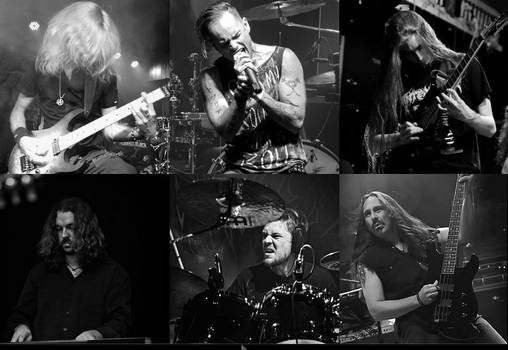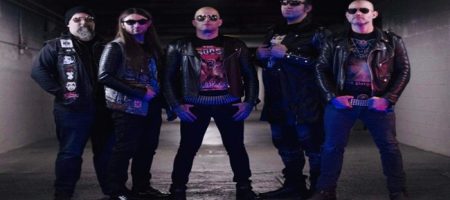Eternity’s End – Hotter Than Fire
Sunday, 7th April 2019
Guitarist Christian Münzner probably comes to mind for most tech death fans – his playing for Necrophagist and Obscura putting him on the map during the 2000’s. Following his subsequent diagnosis with focal dystonia and subsequent intensive therapy, he stepped away from Obscura due to their extensive touring regiment. But he wasn’t done in terms of creating new projects/band outlets – as he switched gears for the melodic power/progressive metal band Eternity’s End. Their debut album The Fire Within from 2016 put his skills to the test – composing and performing in a style that combined diverse outlooks of a global perspective.
The demise of their record label Power Prog Records early in the promotional cycle signaled a lack of proper push in North America and Europe- although their Japanese label Avalon did a great job in getting the band notoriety. We now have the follow up Unyielding – featuring a new lineup and more of a neoclassical, Racer X/Shrapnel edge to the proceedings. More over the top melodies, more twin guitar and keyboard synchronization, elevating the band to proficiency rarely heard these days in metal.
Let’s waste no more of your time – this 45-minute talk on Skype with Christian delves into all the lineup changes, securing a new label, plans for a future instrumental record, and a whole host of thoughts on the industry.
Dead Rhetoric: Eternity’s End is back with a new album Unyielding, featuring a few new members this time around. Tell us about the changes and reasons behind the specific players that appear on this recording – do you believe this assembly also changes a bit the dynamic and atmosphere/ feel of the record?
Christian Münzner: Yes, absolutely. There are two very big changes- one of course is that we have a new vocalist. We have Iuri Sanson, originally from Hibria- the first singer was Ian Parry. Another big change is that we have a second guitar player now, Phil Tougas – and he’s not only a second guitar player, but he’s a second composer. We shared the songwriting on this one, as I wrote all the songs on the first album alone. Almost 50/50 on this new record. The change for the second guitar player – I always thought of Eternity’s End as a two-guitar player thing with the songs – the songs are written for two guitar players, and if we ever were able to play live, we would definitely need two guitar players anyway. When I finished demoing the new tunes, I noticed there was a much bigger emphasis on guitar harmonies and the Racer X thing. All the songs ended up having more harmonies than the first album – and Phil I’ve known him for a very long time online. We think the same way about metal – and I talked about this on Facebook, adding a second guitar player and he came in. We made this happen, I sent him some demos and he sent me some riffs back and so often they were the missing link to some of my songs. It worked out so well, he came up with some songs and he would be missing certain parts and I would come up with a solo section – we worked together very well in terms of playing and writing. We share the exact same philosophy and mindset about metal, so it was the right choice.
There’s more of a US and speed metal element to the album now, it sounds rougher than the first one which was more melodic and progressive metal. With Ian, he was never going to be available for playing live. The approach of the first record, he has more of an AOR/melodic hard rock voice and background, and this ended up being more speed and thrash-oriented so the songs called for a more high-pitched style of singer. Ian asked me if we played live to tune down the songs even further, which wouldn’t have worked with all the samples, choirs, and everything- a whole step tuned down from standard, which wouldn’t have worked well in power metal. There was no bad blood, we are still good friends. I asked him if he would be okay with me keeping the name as I wanted to take Eternity’s End to the next level, and he was fine with that.
With Iuri, he is both my and Phil’s favorite contemporary vocalist. We love the first Hibria record Defying the Rules from 2004, and we never approached him because he is in that band. Then one day we heard everybody had left the band – we tried contacting him through Instagram, sent him a couple of demos and he really liked the songs. He wrote many of the vocal melodies by himself, and it felt more like a real band effort this time. Someone would send riffs here, another person would contribute something else, even though it was an online collaboration it felt more like a band effort. It changes the dynamics and the overall sound and appearance of the band, you are right.
Dead Rhetoric: And you were also able to get Symphony X bassist Mike LePond as well to appear on this, correct?
Münzner: Right- this was because I wanted to give a different face to the whole thing. I didn’t want this to be an Obscura side-project thing, I wanted to get rid of this stigma. Linus (Klausenitzer) was very busy with Obscura, and he was telling me because of his day job and Obscura touring a lot he wasn’t as available, which I can understand. Mike was really into it, and I was looking for more of that style with the tapping stuff. We had contact with Mike through our keyboard player Jimmy Pitts, because they played together in another project. We sent him some of the songs, he really liked them, and the rest is history.
Dead Rhetoric: Do you believe gaining Iuri Sanson (ex-Hibria) on vocals allowed you to venture into upper echelon power metal heights on songs like “Cyclopean Force” and “Under Crimson Moonlight” that weren’t necessarily in the wheelhouse of previous singer Ian Parry?
Münzner: It was something I always wanted to do because of Iuri. There are no limits when it comes to his vocal range. You can go into this super high, epic vocal approach. Phil and I really love that – and with Iuri there are no limitations. What I like about him is he maintains the power, I don’t think his voice loses strength. It allows us to write a little freer in that regard.
Dead Rhetoric: When it comes to the extended lead sections and interplay between yourself and keyboardist Jimmy Pitts – how do these parts develop? Is it more of a back and forth compare and contrast aspect between the two of you to see what works best and then meld the ideas together – or does the process change from track to track?
Münzner: Whenever we go into the harmonizing stuff, it’s completely written out- either Phil would write a harmony section, or I would write out a harmony section for a song. Individual leads, we would leave those parts open and everyone improvises those solos. For example, with “Into Timeless Realms” you have two harmony sections and three individual solos, the harmony sections we had to decide who wants to play on which part. The guitars were divided out 50/50, and Jimmy of course still plays his keyboards in most of those songs. The first album had a lot of guitar and keyboard tradeoff sections, on this new one we had more harmonies and interplay between the three of us.
Dead Rhetoric: Unyielding is also a concept record – with the lyrical content handled by yourself, Phil Tougas, and Iuri. Tell us about the storyline, and the challenges of keeping things cohesive with three separate lyric writers?
Münzner: Yes. The idea of turning this album into a concept record was not there initially. We didn’t know what we wanted the songs to be about, the lyrics and the themes. We agreed that we wanted to take an escapist approach- to us power metal is all about escapism, fantasy kind of world away from the real- life problems or issues. We thought it would be best to go full on science fiction or fantasy topics. We figured that many of the lyrics went into the same direction, space battles, time travels. We wanted to have this medieval kind of sorcery thing going on that can be a part of power metal as well. We wanted to combine it was some sci-fi themes of the 1980’s – like Masters of the Universe – sort of Conan meets that.
We developed the story and the other lyrics we wrote once the story was set. What happens in the story is, it’s an alternative timeline, or a parallel universe, in the year 1099 a spacecraft from a very highly developed alien race crashes on Earth during the Middle Ages. Humans of this time period find this space ship and see this technology and within a short period of time develop a great understanding of space travel and weapon technology. But they are still barbaric and live by the rule of the sword. They cannot really handle this from a social standard, there’s a lot of unrest in the galaxy. They go on a long travel to Earth and try to destroy the human race, causing cosmic unbalance. This creates a long 900 years interstellar conflict. The lyrics go on to describe this difficult time period. You can see this as being metaphoric for real life situations, countries with people that are still killing each other because of beliefs. It’s an unsettling idea, and it’s a whole idea represented in a more of an over the top, sci-fi / fantasy setting.
Dead Rhetoric: Did you divide out the lyric writing between the three of you?
Münzner: Not really. The majority of the concept was developed by Phil. I don’t know how he did it, but he’s an absolute genius when it comes to things like that. Iuri had lyrics to one song written, and I added some lyrics to it before we decided on making this a concept. I had two songs written with lyrics, the title track and “Under Crimson Moonlight”. After this, Phil was so good with the lyric writing, so he finished the rest of it – there are situations like “Horizonless” where the lyrics were written by Phil but one section we had an idea to extend a little bit. You need one person in charge of the concept, it was a little bit of a challenge. If everyone had an equal amount of lyric writing, I don’t think it would have come out the same. It would have been chaotic and random, and we wanted to avoid that.
Dead Rhetoric: You went with Adam Burke from Nightjar Illustrations for the cover art – tell us about the concept for the cover, and how you feel the process went?
Münzner: Originally, Adam was our first choice, but we couldn’t get ahold of him. We started working with another guy, who had a graphic designed, computer generated cover but we didn’t really like those ideas. There were complications in dealing with him, and at one point he just disappeared. Then we contacted Adam, he got back to us and Phil laid out the concept to him. He wrote out very small details in a very long text. The idea of the concept came from the inspiration of Ashbury’s album Endless Skies – where they have the wizard on the cover and you see mountains in the back. We wanted different scenery on our cover, but the perspectives are very similar. The cover describes a scene from the story line- when the aliens are attacking Earth, you see the four warriors with those laser swords. Adam worked in a style we liked from his other paintings. He really grasped the concept that we liked. He made every detail that we wanted in there, and that was quite difficult to make – we wanted to have certain details on the space ships, the city, etc. I think he did an amazing job with it. We were a bit worried- power metal covers these days, they’ve become very generic. The same types of artists and visionary style. This is more of an old school approach, but we’ve had very good feedback for it.
Dead Rhetoric: When it comes to the production, obviously you guys are doing a lot of the recording separately in-home studios- and came together with Piet from Iron Savior to mix and master. Discuss the challenges of pulling this together to make it sound so complete and cohesive?
Münzner: I recorded all the rhythm guitars at my place, Phil recorded all his leads at his place, Hannes recorded his drums at his studio- so there were so many things going on. The challenge, with all the musicians being professional there was no problem with the delivery of it. Sometimes when you are all in the same room, it’s easier to make decisions together when there is a questionable decision to make. The challenge was when it went to Piet, he wanted to make little changes here and there – and then you have to communicate that back to the musician, and can you change that part in the studio because it needs to match up better with the choirs. Iuri recorded his vocals in Brazil and Piet did the choirs in Hamburg, Germany – we needed to match things up. Piet would send Iuri a guide line for him to go back and record a part again the way he wanted to match up- there was a change in another song with Phil. I had to handle the different time zones between countries too. The way things can be explained, misunderstanding can happen – you try to do it through e-mail. When you are all together in the same room, it’s much easier. I’m very happy with the outcome in the end – even if there were two or three stressful moments.
It would definitely be nicer if everybody lived in the same city and we could all go to the studio together and decide together. It just wasn’t possible, and I can’t find musicians at that level here in my hometown. There are ways to make it work – it’s a good point that you picked up on the challenges of that approach.
Dead Rhetoric: What can you tell us about the frustrations that happened relating to your previous label Power Prog Records closing shop, and how you came to the decision to sign with Ram It Down Records plus Avalon for Japan?
Münzner: That was really unfortunate. Power Prog as a label, they vanished maybe two or three months after our album was released. I could not get ahold of the label anymore, the head of the label got burned out, then it was passed on to someone else and that guy didn’t get back to any messages anymore. He did not pay back the money that they still owed one of their bands. They still owed me a couple of thousands of Euros as well. The worst part about this is that they did no real promotion, no interviews or reviews outside of a couple of online magazines in the media. I did an interview recently with Deaf Forever magazine in Germany and the editor didn’t even know the first album existed- it didn’t go to any of the big magazines. It’s almost like we haven’t done this album, which can be frustrating. The only good thing that came out of this first label is they got us the deal with Avalon – they did an amazing job in Japan. When we decided to keep going with the band, and used the name, I contacted them and they made me a good offer, so for Japan the deal was set the day we decided to keep going.
In Germany and in Europe, it was more frustrating. Many of the bigger labels, they didn’t pick up on it. It didn’t fit into what they could sell as power metal, there’s too many solos, the vocals are too high-pitched, it’s too heavy and it’s too fast. It sounds too hectic to too many listeners, because power metal nowadays is a watered-down genre and many labels are scared to sign high energy bands like (us). In that genre at least, in comparison to say tech-death. Then we got some offers from smaller labels, and Ram It Down had a very fair offer. The guy (Timo) who runs the label is very experienced, as he works at AFM. He knows his business, he knows what he is doing, and he’s done an amazing job so far. Within the last week there have been more interviews and reviews than there were for the entire last record cycle. I really think we made the right decision- I think it was also good we didn’t jump on the first offer from any of the smaller labels. We waited for the most decent one to come around.
Pages: 1 2




























